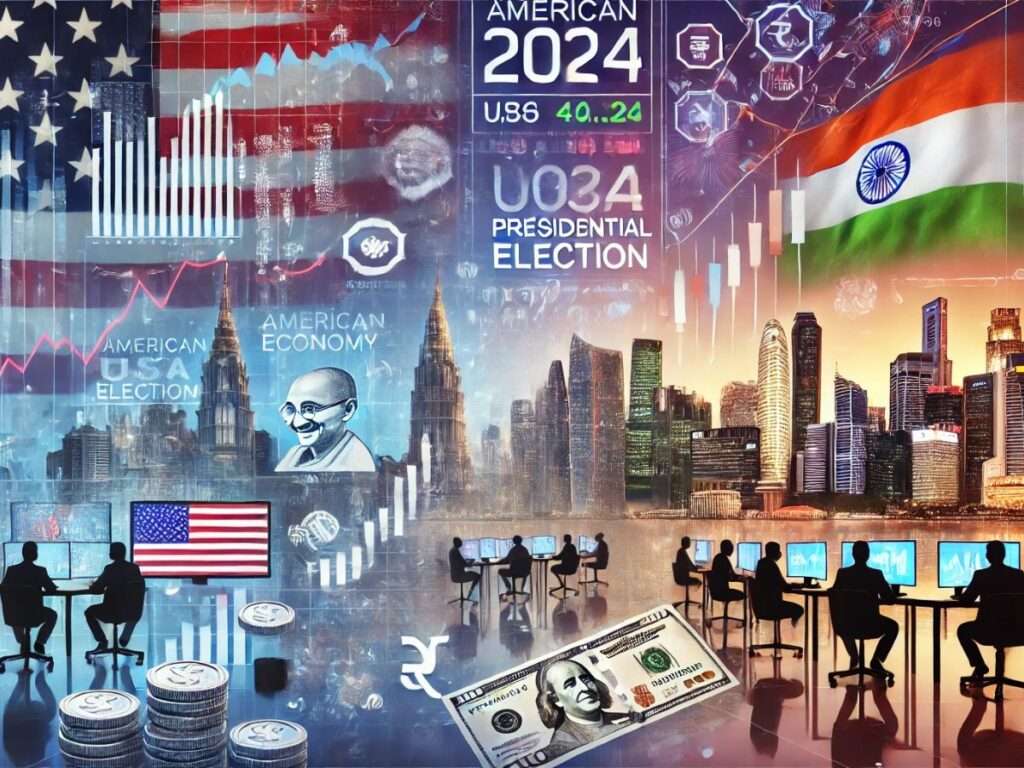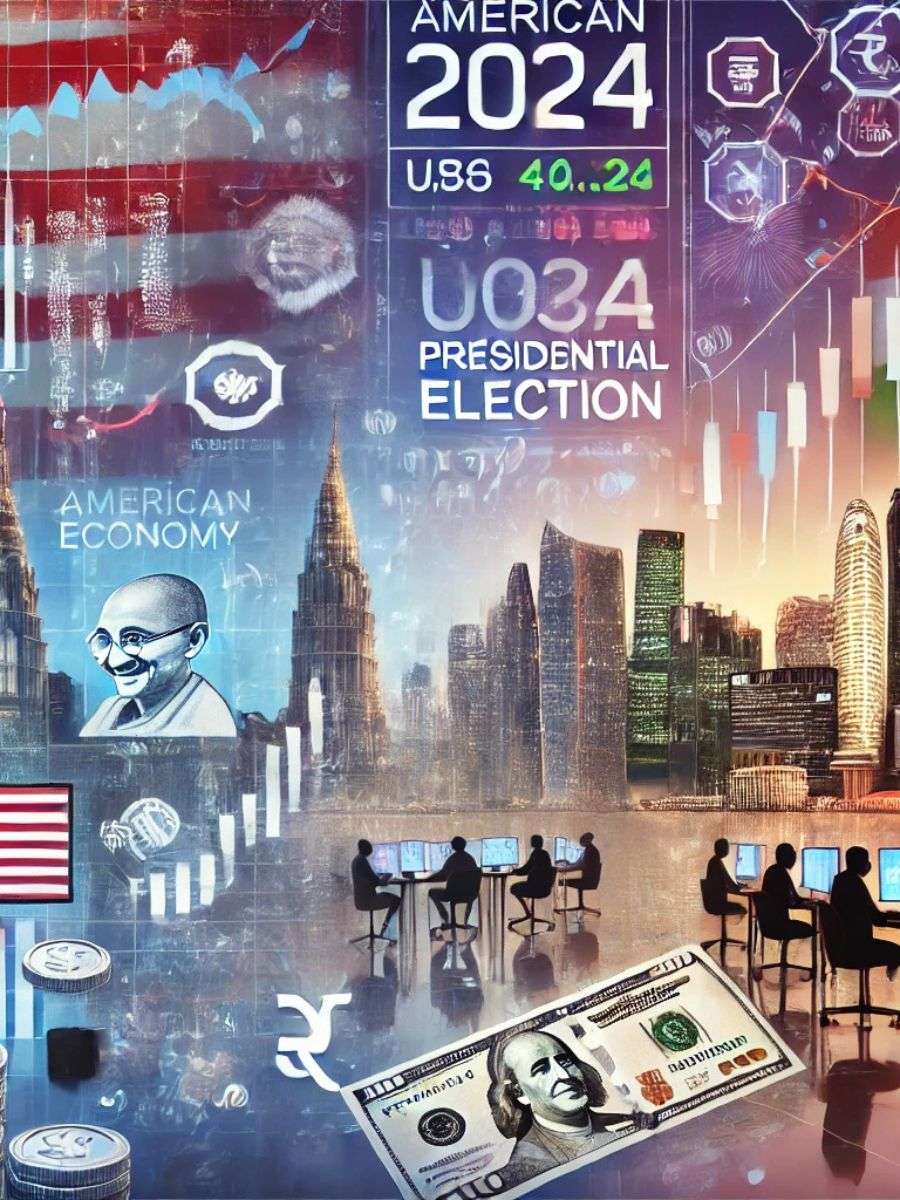The upcoming 2024 US Presidential Election is not just an American affair; it will carry significant consequences for India. Given the strong economic, political and strategic ties between the two countries, any change in the US administration could bring changes that impact many sectors in India. From trade and technology to defence and foreign policy, here is an in-depth look at the potential impact of the 2024 US Presidential Election on India.

Implications for the Indian IT sector
Heavy dependence on US revenues
The Indian IT industry, one of India’s largest sectors, earns a large portion of its revenues from the US. Tech giants such as Tata Consultancy Services (TCS), Infosys and Wipro have long-standing relationships with US clients, with more than half of their revenues coming from the US market. This dependence means that any regulatory or economic policy change in the US could significantly impact the profitability and growth trajectory of Indian IT companies.
Immigration Policies and Talent Mobility
A Trump win could potentially mean more restrictive immigration policies, particularly on H-1B visas, which are crucial for Indian professionals in the US. Trump’s policies in the past have tightened the issuance of these visas, impacting the ability of Indian IT firms to send skilled workers to the US. However, many Indian companies have prepared for such outcomes by hiring more local talent and setting up on-site centres in the US, thereby mitigating some of the risks.
On the other hand, a Democratic win could signal a more open immigration policy. Under the leadership of a Democrat, Indian IT firms could benefit from a looser visa regime, helping them manage talent across borders more effectively.
Corporate IT Spending and Regional Stability
Regardless of who takes office, historical patterns suggest that corporate IT spending in the US has remained stable, with digital transformation driving continued demand. Companies in sectors such as banking, financial services and insurance (BFSI) are expected to continue investing in digital upgrades, providing continued revenue opportunities for Indian IT firms. Analysts cautiously expect that the 2024 US Presidential Election, while important, may not drastically change IT spending.
Geopolitical Dynamics: US-China-India Relations
Anti-China Stance and Opportunities for India
Both Republican and Democratic candidates have shown a stance against China, with a focus on reducing America’s dependence on Chinese manufacturing and supply chains. This sentiment provides India with a unique opportunity to establish itself as a reliable partner for the US, potentially attracting US companies looking to relocate or expand operations outside of China.
If the next administration continues with a strong anti-China policy, India could benefit from increased trade opportunities, particularly in electronics, pharmaceuticals and manufacturing. However, India must ensure that it has the infrastructure and policy environment to attract these investments.
Strengthening defense and strategic ties
India has become an important strategic partner for the US in the Indo-Pacific region, a relationship that has deepened amid mutual concerns about China’s growing influence. The US has supplied defense technology to India, and cooperation has expanded in areas such as intelligence sharing and maritime security.
Depending on the 2024 US Presidential Election results, this defense cooperation could either deepen or shift. With a Republican or Democratic victory, India could continue to see US support in strengthening its defense capabilities, further establishing India as a regional security partner. India could also benefit from expanded defense technology transfers and joint exercises if the incoming president prioritizes these ties.
Economic sanctions and trade policies
Trade policies will also be an important factor. Any move by the US to impose sanctions or raise tariffs on specific goods could indirectly benefit India by diverting trade away from China. However, a more protectionist approach could also lead to tariffs on Indian exports, impacting sectors such as textiles, electronics and pharmaceuticals. For India, it is important to prepare for such possibilities and diversify its trade relationships.
Macroeconomic impact and financial market reaction
Capital flows and foreign direct investment
US economic policies directly impact capital flows into emerging markets such as India. For example, a looser monetary policy in the US could lead to more capital flows into Indian markets, strengthening the rupee. Conversely, tighter US monetary policies could lead to increased capital flows out of India as investors return to US assets.
Stable US-India trade relations after the 2024 US Presidential Election could boost foreign direct investment (FDI) in India, especially in the technology, manufacturing and renewable energy sectors. An administration that favors global cooperation could further boost this investment trend, benefiting India’s long-term economic growth.
Stock Market Sentiment and Indian Rupee Stability
The Indian stock market usually reacts to 2024 US Presidential Election, as foreign investment, especially from the US, plays a significant role in Indian equities. An anticipated Democratic win could boost renewable energy and technology stocks, while sectors such as defense and oil could see a positive response to a Republican win. Irrespective of the outcome, financial markets are likely to experience short-term volatility.
The stability of the rupee is another factor, as its value fluctuates based on foreign investment, US interest rates and overall economic policy. For example, a stronger dollar due to higher US rates could weaken the rupee, impacting imports and increasing costs for India’s energy sector. Conversely, a weaker dollar could make imports cheaper, supporting sectors dependent on foreign goods.
Trade and Economic Growth Prospects
Bilateral Trade Opportunities
The US is one of India’s largest trading partners, and any positive changes in bilateral trade policies after the 2024 US Presidential Election could expand India’s export market. Sectors such as textiles, pharmaceuticals and automotive components could benefit if the US administration promotes tariff cuts and removes trade barriers.
If India and the US negotiate a free trade agreement (FTA) under the next administration, it could be transformative, allowing easier access for Indian exports and boosting US investment in India. However, India will need to carefully balance such an agreement to avoid challenges for its local industries.
Foreign Policy and Diplomatic Relations
The US administration’s foreign policy stances will also shape India’s diplomatic approach. A government that prioritises strong US-India ties will foster a stable environment for India at international forums such as the UN, G20 and BRICS. Strategic alignment at global forums can strengthen India’s voice in international policy, from climate change to trade agreements and regional security.
Defence and Energy Sector
While the IT sector is highly influenced by US economic trends, other sectors such as defence and energy can also see considerable impact. US support in defence technology and equipment enhances India’s capabilities. In energy, the Democratic focus on clean and renewable resources can create opportunities for Indian green energy firms. In contrast, the Republican focus on fossil fuels can impact import and export partnerships in these sectors.
Conclusion: A balanced approach for India amid uncertainty
The outcome of the 2024 US Presidential Election will undoubtedly impact India in the economic, technological and geopolitical spheres. For the Indian IT sector, while policy changes may pose challenges, stable corporate demand and adaptive strategies can help mitigate risks. Geopolitical shifts could provide India with unique advantages as a trade and defense partner, especially if the US continues its focus on countering China’s influence.
Overall, India will benefit from continued US cooperation, but must remain agile in responding to any trade, defense, and economic policy shifts. India’s ability to take advantage of these opportunities will depend on fostering a favorable environment for foreign investment, ensuring strong infrastructure, and maintaining strategic partnerships on the global stage. With these elements, India can strengthen its global position and maximize the potential benefits of the outcome of the 2024 US Presidential Election.
ZERODHA 1) : https://zerodha.com/open-account?c=EJ4366
Angelone 2) : https://tinyurl.com/2gloc3g6 or
Upstox3): https://link.upstox.com/9w4tNo1rK8au7VK47









